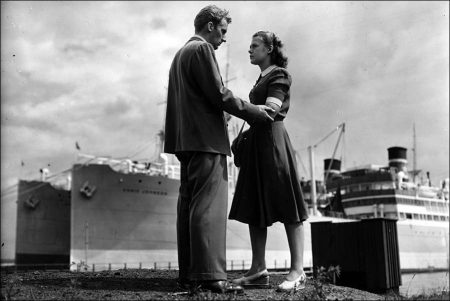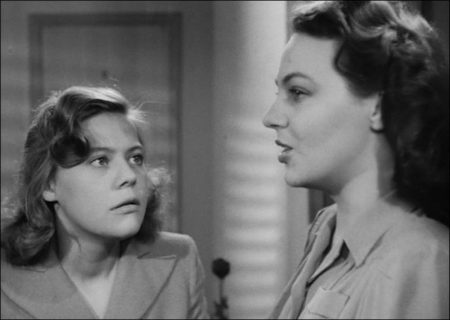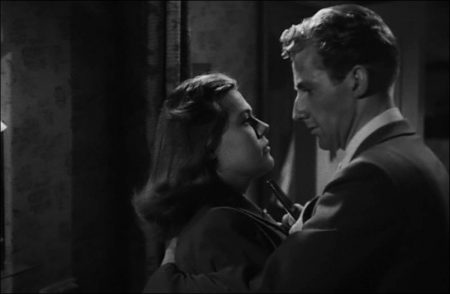Port of Call movie storyline. Berit is a factory girl fresh out of reformatory school and fresh from an attempted suicide by drowning when she meets a sailor named Gösta at a dance club. He beds her down that night, and later, when the two become lovers, allows himself to assume that he was the first man to do so. Meanwhile, Berit is desperate to be free: free from the badgering and manipulation of the mother she is forced to live with, free of the dirty work of the factory and free of her social worker and the constant threat of returning to reformatory school. Her already unhappy life is complicated when an old friend from the school desperately needs her help.
Port of Call (Swedish: Hamnstad, lit. ‘Port Town’) is a 1948 Swedish drama film directed by Ingmar Bergman and starring by Nine-Christine Jönsson, Bengt Eklund, Mimi Nelson, Berta Hall, Birgitta Valberg, Britta Billsten, Harry Ahlin, Sven-Eric Gamble, Nils Hallberg, Yngve Nordwall and Nils Dahlgren.
Film Review for Port of Call
When Port of Call (Hamnstad) was released in 1948, it was already the fifth film that the thirty-year-old Ingmar Bergman had directed. It included a number of stylistic features that demonstrated the range of Bergman’s cinematic expressiveness even then. One such element was the film’s presentation of working-class realism, a particularly popular mode of expression during a period that marked the rise of Italian Neorealism.
But unlike a number of neorealistic films of that time, Port of Call does not have a largely unprofessional cast from the given social milieu. Bergman had a stage theatrical background, and the visual production of this film, in collaboration with cinematographer Gunnar Fischer, was very carefully composed, staged, and photographed according to Bergman’s preset dramatic requirements.
In fact the careful staging of Port of Call’s dark, brooding environment, along with the dead-end prospects of its two main characters, contribute to another feature of the film – it’s film noir flavor. Despite the noirish tendencies, though, this film also addresses some social issues, notably two of particular interest across the world at that time – juvenile delinquency and abortion.
The story concerns two relatively disconnected souls, Gösta, an ordinary sailor who has just landed in the port of Gothenburg after a long voyage, and Berit, a young woman with a troubled background. The first few scenes show that Gösta is tired of being at sea and wants a landlubber job, while Berit is so down that she attempts suicide by jumping off the same pear that landed Gösta’s incoming ship.
A short time later, however, Gösta, not recognizing the girl who had just attempted suicide, picks up Berit at a local dance hall and escorts her home. Although neatly attired in a coat and tie, it is clear that the relatively taciturn Gösta does not have very advanced social skills. But they are good enough to get what he wants – the opportunity to go to bed with Berit that evening. The rest of the film charts the ups and downs of their rather fragile relationship.
It is soon revealed that Berit has a miserable home life and has spent a considerable amount of time at a reformatory. Berit’s mother is a cold and scornful person who would be impossible for anyone to live with. She mistreats her daughter at every opportunity and does everything she can to undermine the girl’s shaky existence. Berit’s time locked up in a reformatory was due to some sexual episodes she had when she was a teenager, and now everyone around her (except Gösta who is unfamiliar with her past) dismisses her a “tart”. Although she is currently “free” to live at home with her mother, Berit is constantly threatened with being sent back to the reformatory if she makes one more false move.
Nevertheless, Berit’s relationship with Gösta progresses well, in its own stumbling fashion, thanks to the encouragement of Berit. Gösta takes her for a night to a hotel room where they can do as they please, and Berit is clearly in love. But now she is faced with a crisis – she feels that for their relationship to proceed, it is necessary for her to tell Gösta about her scandalous background, and she does so.
Although Gösta is a bit different from his longshoremen comrades in that he actually reads books on occasion (seeing this, an older workmate friend grabs his book and warns him that he is wasting his time), he is till a conventional male. Learning about Berit’s past sexual adventures turns him off Berit, and their relationship hits the rocks.
Their own difficulties are interrupted at this point by the more severe problems of Berit’s old reformatory friend Gertrud. The girl suddenly needs an abortion, and she has to go to an underground practitioner to have it performed. This was a topic of particular interest to contemporary Sweden, which in 1946 had legalized certain abortions for “social medicinal grounds” – for example, as mentioned by Berit, abortions were okayed when a girl was made pregnant by a retarded person and the potential child would presumably be a burden on the state. But abortions in general were unavailable to desperate young women.
As we almost expect in this dark tale, Gertrud soon dies from complications of the abortion’s aftermath. Berit is immediately detained by the police, who seek the identity of the abortionist in order to make an arrest. Threatened by the authorities with three more years in the reformatory if she doesn’t tell them, the browbeaten Berit finally breaks down and caves in to their demands.
Meanwhile the man of few words, Gösta, is still agonizing over Berit’s scandalous past, and he expresses his frustrated feelings by going on a destructive rampage in his apartment. But at the very end of the film, Gösta comes to Berit and asks forgiveness for his pigheaded reaction to her life’s story. Berit is thrilled to hear what she had always longed for. They agree that no matter how badly the world might treat them, they cannot be happy living without each other.
Although Port of Call seems to package itself as an essay on the social problems of young women and delinquency in contemporary Sweden, it doesn’t come across well on that level. This is primarily the fault of the exaggerated characterizations of just about every authority figure in the film. The police, the factory managers, the social worker, and Berit’s mother are so categorically against young women, and so stupefyingly heartless to the point of cruelty in general, that it destroys all viewer empathy for what they might represent.
Indeed these stilted performances undermine the suspension of disbelief that is required for the viewer to engage with the narrative. Even Gertrud’s father, whose only appearance in the film comes when he is questioned by the police after his daughter’s death, says of her demise, “she never gave my any joy. Perhaps it’s turned out for the best.” So much for any hint of parental compassion. But the film is redeemed as a love story, and this is almost entirely due to the moving performance of Nine-Christine Jönsson as Berit. While Bengt Eklund as Gösta is relatively wooden, Nine-Christine Jönsson’s performance reveals a character that seems to be the only real person in this story capable of genuine human engagement.
Even though she is cast in a rather melodramatic role, Ms. Jönsson manages to come across as a compassionate and vulnerable young woman who, despite repeated disappointments and reversals, is always opening her heart to the people she meets. Her responses, alternatively anxious, depressed, and joyful, are convincing throughout. Although she is not a naturally glamorous girl, she wins Gösta over, and she won me over, too.
Port of Call – Hamnstad (1948)
Directed by: Ingmar Bergman
Starring: Nine-Christine Jönsson, Bengt Eklund, Mimi Nelson, Berta Hall, Birgitta Valberg, Britta Billsten, Harry Ahlin, Sven-Eric Gamble, Nils Hallberg, Yngve Nordwall, Nils Dahlgren
Screenplay by: Ingmar Bergman, Olle Länsberg
Production Design by: Nils Svenwall
Cinematography by: Gunnar Fischer
Film Editing by: Oscar Rosander
Music by: Erland von Koch
MPAA Rating: None.
Distributed by:
Release Date: October 11, 1948
Views: 198



